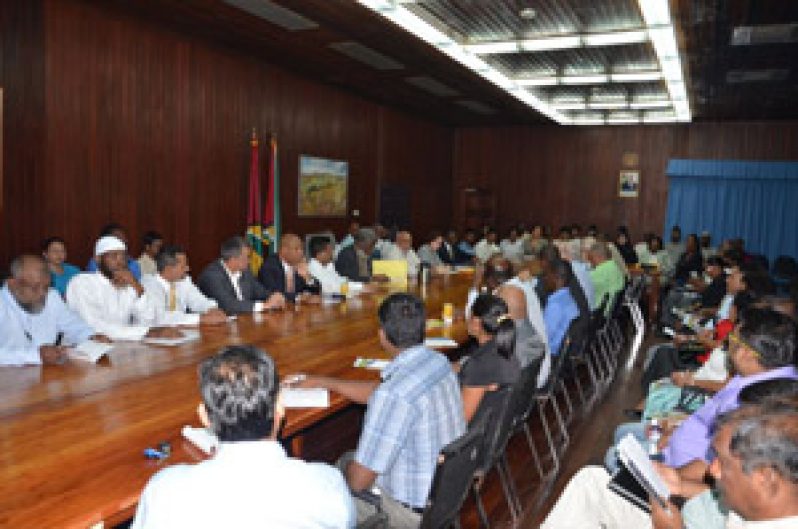AS parliamentarians continued debate on the 2013 National Budget yesterday, President Donald Ramotar met civil society stakeholders to discuss the budget’s priorities and to garner their feedback.
 There was general consensus that this year’s budget is “a people’s budget” “a consumers’ budget”, “one that addressed the vulnerable in society” and “one that can work”. Among those present were the Private Sector Commission (PSC), Georgetown Chamber of Commerce and Industry (GCCI), religious organisations, trade unions, and members of the legal fraternity.
There was general consensus that this year’s budget is “a people’s budget” “a consumers’ budget”, “one that addressed the vulnerable in society” and “one that can work”. Among those present were the Private Sector Commission (PSC), Georgetown Chamber of Commerce and Industry (GCCI), religious organisations, trade unions, and members of the legal fraternity.
Recommendations on several issues that in the stakeholders’ perspectives need strengthening in the budget were advanced, giving the government a clear idea of the stakeholders’ take of the Government’s 2013 financial plan.
The PSC in particular is pleased that several of its recommendations were well received by Minister of Finance, Dr. Ashni Singh, and at yesterday’s meeting they used the occasion to highlight some outstanding areas.
Among them is the expansion of the Demerara Harbour to accommodate larger marine vessels and a transformation of the University of Guyana.
The private sector is also supportive of electricity subsidy to the Linden community, but is of the view that an effective management structure is needed for that funding to be well spent. The proposal to increase the town’s electricity tariff was shelved, and a review committee set up after a violent protest in the town last year.
Minister Singh announced that budget 2013 has allocated $2.9B to meet the cost of maintaining the electricity subsidy in Linden and Kwakwani, so that 10,363 electricity customers in Region 10 can continue to benefit from the currently prevailing rates through the remainder of the year.
Former Toshao, Yvonne Pearson, who represented the indigenous population, expounded on developments in hinterland communities, particularly in the area of physical infrastructure (roads, bridges and airstrips) that are important to the livelihood of the people.
Continuing the process of land titling and demarcation, funding of Community Development Projects (CDPs), entrepreneurship and training of Amerindian youths, all of which have been catered for in this year’s budget, remain a priority for them.
The passage of the national budget however, hinges on cooperation in a divided Parliament, where the opposition has a one seat combined majority that was used last year to reject budgetary allocations to key sectors, agencies and development projects.
The stakeholders are calling on Parliamentarian to let good sense prevail this time around, amidst several utterances in the opposition camp to take a course of action similar to last year’s.
“There has been a concern about constructive dialogue in Parliament. Everyone is concerned about that on both sides of the House, and I think civil society generally wants to ensure that Parliament engages in constructive criticism… so that we can emerge and not create any kind of fears in the society,” PSC member Ramesh Dookhoo, who was part of yesterday’s meeting said.
This year’s $208.8B budget covers, among other things, economic diversification and growth, expanded physical infrastructure, high quality social services, and environmental responsibility and sustainability.
Among the highlights is the increase in old age pension by 25 % to $12,500, lowering of personal income tax, and personal income tax relief for persons who are required to pay interest on mortgage of up to $30M.
Other measures include: sugar industry support of $1B, Guyana Power and Light subsidy and capitalisation – $5.8B, a further $5.4 B for upgrade, NIS contribution rate to be increased by 1% – government to meet cost for earners below $50,000, reduction in property tax- small businesses up to $10M will pay none, and reduction in individual property taxes.
“The budget is a presentation of the government’s economic plan, and if that economic plan yearly contributes to the increased growth of the economy, I say it’s a good budget and over the past six years we have had increased economic growth,” President of the Georgetown Chamber of Commerce and Industry (GCCI), Clinton Urling said after participating in the meeting.
The budget, from the inception, attracted criticism from opposition politicians who doubt that it has something in it for everyone, and who will, from next week be voting for or against specific allocations.
During the debate that commenced on Tuesday, government parliamentarians have been calling on opposition MPs to let good sense prevail and to put the country and people first.



.jpg)








